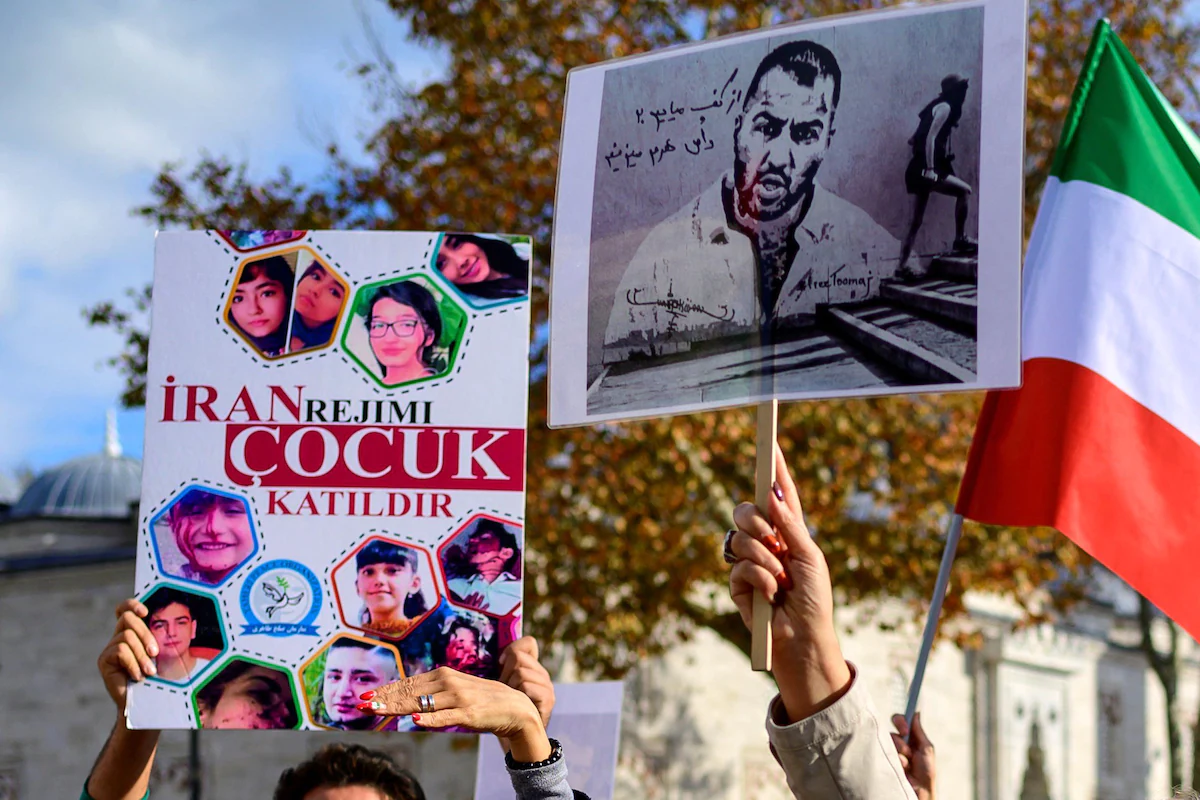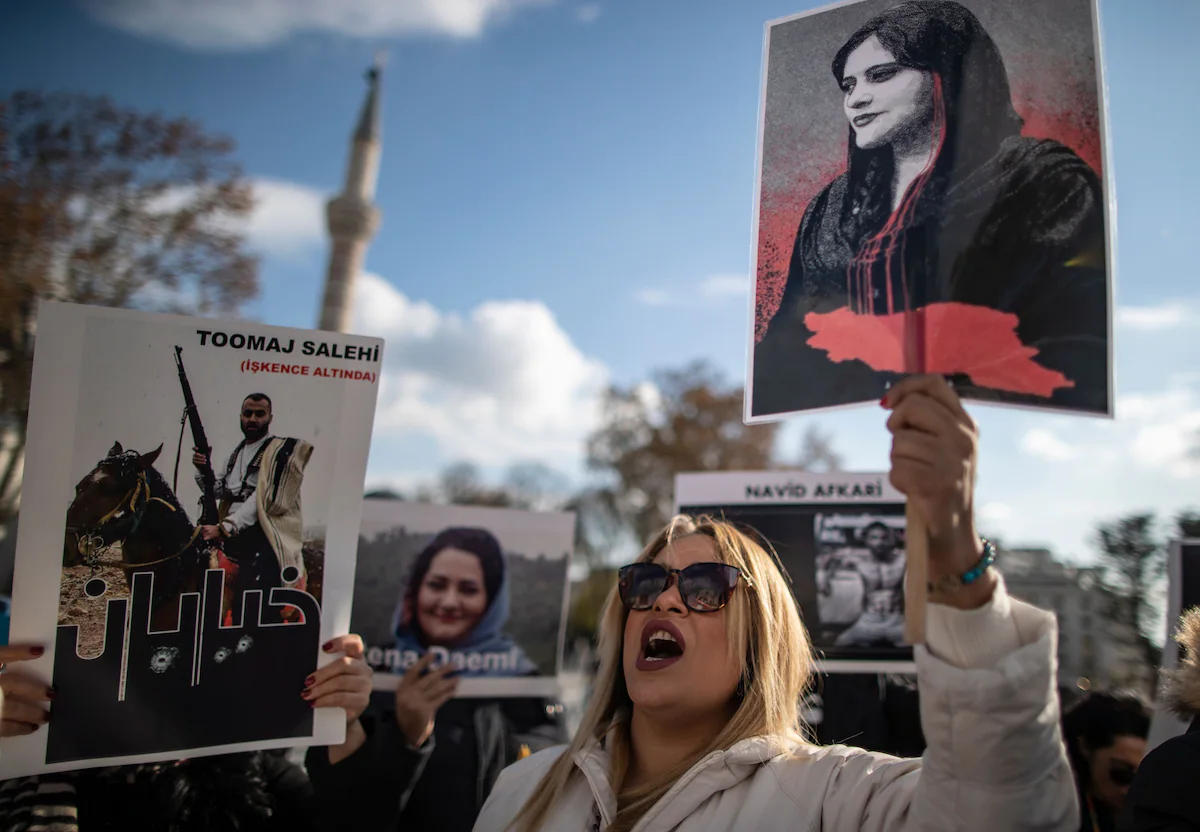
People hold placards depicting Iranian rapper Toomaj Salehi, who was arrested in Iran, and children who were killed during the Iranian protests, during a rally in Istanbul in support of Iranian women on Nov. 26. (Yasin Akgul/AFP/Getty Images)
November 30, 2022 – The Washington Post- By Victoria Bisset- Toomaj Salehi is no stranger to controversy. Last year, the Iranian rapper was arrested for songs criticizing the government and denouncing those he described as apologists for the Iranian government abroad.
He was released on bail earlier this year, but it was not long before he found himself in prison again — and this time he may pay the ultimate price.
The 31-year-old was among the thousands of Iranians who took to the streets across the country to protest the death of a 22-year-old Kurdish Iranian woman in custody of the so-called morality police. Mahsa (Jina) Amini was arrested on Sept. 13 for allegedly wearing an improper hijab and died three days later, sparking a nationwide uprising.
In one video shared on Instagram, Salehi called on fellow Iranians to support the uprising in any way they could, while fellow demonstrators shouted anti-government slogans.
He also channeled his anger in the way he knew best, with searing and uncompromising lyrics directed against the country’s establishment.
“We come from the bottom, we hit the top of the pyramid,” Salehi’s most recent track opened. He went on to describe the current upheaval as the Islamic republic’s “year of colossal failure.”
He also rapped about the victims of the Iranian justice system, including the one whose crime was hair “that moved in the wind,” in a direct reference to protesters opposing the mandatory hijab.
Less than a week later, Salehi was arrested. For his friends and relatives, there was little news at first: His family has not been allowed to meet with him, while the lawyer they appointed says he has not been able to see the details of the case.
Then came the news on Sunday that Salehi was accused of “corruption on earth” — one of the charges leveled against at least five people sentenced to death by courts in Tehran over the protests, according to Amnesty International.
Iranian news outlets have published a photo and a short video clip of the blindfolded rapper saying he had “made a mistake.” His supporters denounced it as a forced confession.
The chief justice of Isfahan province was quoted by the state-run Islamic Republic News Agency (IRNA) as saying Sunday that court proceedings had not yet begun, but that Salehi was also accused of other offenses including propaganda against the Islamic republic, cooperating with hostile governments and inciting violence.
Salehi quickly became a symbol of the two-month-long unrest, with an online petition demanding his release gathering more than 300,000 signatures as of Wednesday.
His official Twitter account has remained active and, in line with Salehi’s wishes, an administrator based outside Iran has continued to post content promoting the protests.
“Joy is a crime in Iran. Dancing is a crime in Iran,” Salehi said in an interview with Canadian Broadcasting Corp. News recorded shortly before his arrest. “A free Iran, in my opinion, is a country where plainclothes [policemen] cannot abduct you from the streets and have the law protect them. A free Iran, in my opinion, is a country where regime agents do not have license to commit rape.”
The rapper stressed that he was just one protester among many, but he appeared well aware of the risks he faced.
“Every time that I go to a protest, everyone is worried that if I get arrested, a part of the protesters will become hopeless and upset, because we don’t need sadness now,” he said in a longer recording of the interview shared on his official YouTube channel. “If the two people next to me get killed, I shouldn’t cry — I should be angry and seek justice.”
However, Salehi is not the only artist targeted by Iranian authorities since the protests began.
One song, “Baraye,” listed the decades-long grievances of many ordinary Iranians and quickly became synonymous with the protests. Its singer and creator, Shervin Hajipour, was arrested and later released on bail, but not before the song was deleted from his Instagram account.
Others have faced even harsher consequences: Kurdish singer and rapper Saman Yasin is being held in the notorious Evin prison on charges of “moharabeh,” or waging war against God — a capital offense. According to the Paris-based Kurdistan Human Rights Network, he was “subjected to severe physical and mental torture” before making a televised confession.
At least six protesters have been given death sentences since the unrest began, the Human Rights Activists News Agency (HRANA) reported. And while the death penalty can sometimes be commuted in Iran, executions in the country have reached a five-year high this year, the United Nations said this week.
More than 450 people have been killed in the 74 days since the protests began, including more than 60 children, according to HRANA. As many as 15,000 protesters have also been arrested, Germany’s foreign minister said last week. The United Nations’ human rights body ordered an investigation into the crackdown against protesters.

Protesters hold an image of Toomaj Salehi and Mahsa Amini in Istanbul on Nov. 26. (Erdem Sahin/EPA-EFE/Shutterstock)
“It pains me to see what is happening in the country,” said Volker Türk, the top U.N. human rights official. “The images of children killed. Of women beaten in the streets. Of people sentenced to death.”
But a U.N.-appointed independent expert warned Tuesday that the creation of the fact-finding mission could embolden Iranian authorities, who have already said they will not cooperate with the investigation.
“I’m afraid that the Iranian regime will react violently to the Human Rights Council resolution and this may trigger more violence and repression on their part,” Javaid Rehman told Reuters news agency Tuesday, adding that authorities have “started a campaign of sentencing [protesters] to death.”
Iran has sought to downplay the unrest, which Iran’s supreme leader, Ayatollah Ali Khamenei, blamed on the United States and Israel.
But a senior member of Iran’s Revolutionary Guard Corps said this week that more than 300 people have been killed or “martyred” in the two months since the protests began. Addressing students at a university in Tehran, Brig. Gen. Amir Ali Hajizadeh said young Iranians have not experienced war or revolution and are therefore unable to recognize their own “enemies,” implying that they are victims of a foreign conspiracy.
